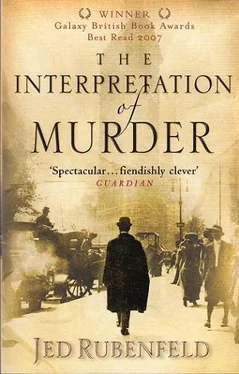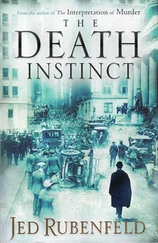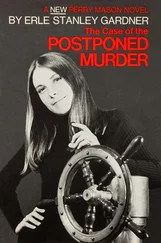Jed Rubenfeld - The Interpretation of Murder
Здесь есть возможность читать онлайн «Jed Rubenfeld - The Interpretation of Murder» весь текст электронной книги совершенно бесплатно (целиком полную версию без сокращений). В некоторых случаях можно слушать аудио, скачать через торрент в формате fb2 и присутствует краткое содержание. Жанр: Исторические приключения, на английском языке. Описание произведения, (предисловие) а так же отзывы посетителей доступны на портале библиотеки ЛибКат.
- Название:The Interpretation of Murder
- Автор:
- Жанр:
- Год:неизвестен
- ISBN:нет данных
- Рейтинг книги:5 / 5. Голосов: 1
-
Избранное:Добавить в избранное
- Отзывы:
-
Ваша оценка:
- 100
- 1
- 2
- 3
- 4
- 5
The Interpretation of Murder: краткое содержание, описание и аннотация
Предлагаем к чтению аннотацию, описание, краткое содержание или предисловие (зависит от того, что написал сам автор книги «The Interpretation of Murder»). Если вы не нашли необходимую информацию о книге — напишите в комментариях, мы постараемся отыскать её.
The Interpretation of Murder — читать онлайн бесплатно полную книгу (весь текст) целиком
Ниже представлен текст книги, разбитый по страницам. Система сохранения места последней прочитанной страницы, позволяет с удобством читать онлайн бесплатно книгу «The Interpretation of Murder», без необходимости каждый раз заново искать на чём Вы остановились. Поставьте закладку, и сможете в любой момент перейти на страницу, на которой закончили чтение.
Интервал:
Закладка:
'Can you try?' asked the mayor.
'The devil,' said Banwell. 'I'll see what I can do. By the way, who are these — these specialists looking at Nora?'
'Didn't I tell you?' answered the mayor. 'They are therapeutists. Apparently they can cure amnesia just by talking. Fascinating business, actually. They get the patient to tell them all kinds of things.'
'What kinds of things?' asked Banwell.
'All kinds,' answered McClellan.
Coroner Hugel, obeying the mayor's orders, went back to his home, the top two floors of a small wood-frame house on Warren Street. There he lay down on his lumpy bed but didn't sleep. The light was too bright, and the shouts of the teamsters were too loud, even with a pillow over his head.
The house in which Hugel lived was at the outer edge of the Market District in lower Manhattan. When he first rented his rooms, the district was a pleasant residential neighborhood; by 1909, it was overrun by produce warehouses and manufacturing buildings. Hugel had never moved. On a coroner's pay, he could not afford two full floors of a house in a more fashionable part of the city.
Hugel hated his rooms. The ceilings had the same disgusting brown-edged water stains he had to endure at his office. Hugel swore bitterly to himself. He was the coroner of New York City. Why did he have to live in such undignified quarters? Why did his suit have to be so shabby compared to the brushed and tailored cut of George Banwell's jacket?
The evidence against Banwell was easily sufficient to arrest him. Why couldn't the mayor see that? He wished he could arrest Banwell himself. The coroner had no power to make an arrest; he wished he did. Hugel went over everything again. There had to be something more. There had to be a way to make the whole story fit together. If Elizabeth Riverford's murderer had stolen her body from the morgue because there was evidence on that body, what could the evidence be? Suddenly he had an inspiration: he had forgotten the photographs he took in Miss Riverford's apartment. Wasn't it possible for one of his photographs to reveal the missing clue?
Hugel climbed out of bed and dressed hurriedly. He could develop them himself: although he rarely used it, he had his own darkroom adjacent to the morgue. No, it would be safer if Louis Riviere, the police department's photographic expert, did the work.
At nine I went to Miss Acton's room. No one was there. By chance I inquired at the front desk, where I found a message waiting for me, in which Miss Acton informed me that she would be back in her room at eleven: I might call on her then, if I wished.
This was all wrong, analytically. First, I was not 'calling' on Miss Acton. Second, it was not the patient, but the doctor, who ought to control the timing.
In the event, I did call on Miss Acton at eleven. She was perched comfortably on her sofa, just as she had been yesterday morning, taking tea, framed by the French doors opening out to the balcony. Without looking up, Miss Acton invited me to take a seat. This irritated me as well. She was too comfortable. The analytic setting ought to have been an office — my office — and I ought to have been in command of it.
Then she did look up, and I was entirely taken aback. She was tremulous and full of agitation. 'Whom did you tell?' she asked, not accusingly but anxiously. 'About what — what Mr Banwell did to me?'
'Only Dr Freud. Why? What's happened?'
She made eye contact with Mrs Biggs, who produced a piece of paper, folded in two, which the old woman handed to me. On the note was written, in pen, Hold your tongue.
'A boy,' said Miss Acton fretfully, 'out in the street — he put that in my hands and ran off. Do you think Mr Banwell attacked me?'
'Do you?'
'I don't know, I don't know. Why can't I remember? Can't you make me remember?' she beseeched me. 'What if he's out there, watching me? Please, Doctor, can't you help me?'
I had not seen Miss Acton like this. It was the first time she had actually asked for my help. It was also the first time since coming to the hotel that she seemed genuinely afraid. 'I can try,' I answered.
Mrs Biggs knew enough to leave the room of her own accord this time. I put the threatening messsage on the coffee table and made the girl lie down, although she plainly did not like it. She was so agitated she could hardly keep still.
'Miss Acton,' I resumed, 'think back to three years ago, before the incident on the rooftop. You were with your family, at the Banwells' country house.'
'Why are you asking me about that?' she burst out. 'I want to remember what happened two days ago, not three years ago.'
'You don't want to remember what happened three years ago?'
'That's not what I meant.'
'It's what you said. Dr Freud believes you may have seen something then — something you've forgotten — something that's keeping you from remembering now.'
'I have not forgotten anything,' she retorted.
'Then you did see something.'
She was silent.
'You have nothing to be ashamed of, Miss Acton.'
'Stop saying that!' the girl cried out, with a fury entirely unexpected. 'What would I have to be ashamed of?'
'I don't know.'
'Go away,' she said.
'Miss Acton.'
'Go away. I don't like you. You are not clever.'
I did not budge. 'What did you see?' As she made no reply but stared determinedly in another direction, I stood and took a chance. 'I'm sorry, Miss Acton, I can't help you. I wish I could.'
She took a deep breath. 'I saw my father with Clara Banwell.'
'Can you describe what you saw?'
'Oh, all right.'
I took my seat.
'There is a large library on the first floor,' she said. 'I often couldn't sleep, and when I couldn't, that's where I would go. I could read by moonlight there, without even lighting a candle. One night, the door to the library was ajar. I could tell someone was inside. I put my eye to the crack. My father was sitting on Mr Banwell's chair, facing me, the same chair I always sat in. I could see him in the moonlight, but his head was thrown back in a disgusting way. Clara was on her knees before him. Her dress was unfastened. It had fallen down past her waist. Her back was entirely bare. She has a lovely back, Doctor, perfectly white, unblemished, the same pure white skin that you see in… in… and shaped just like an hourglass, or a cello. She was — I don't know how to describe it — undulating. Her head rose and fell in a slow rhythm. I could not see her hands; I believe they were in front of her. Once or twice, she threw her hair over her shoulder, but she kept rising and falling. It was mesmerizing. I did not, of course, understand at that time what I was witnessing. I found her movement beautiful, like a gentle wave lapping at a shore. But I knew very well they were doing something wrong.'
'Go on.'
'Then my father began making a repulsive, rasping noise of some kind. I wondered how Clara could stand that sound. But she not only stood it. It seemed to make her undulation grow faster, more determined. He clutched the armrests of his chair. She rose and fell more and more quickly. I'm sure I was fascinated, but I did not want to watch anymore. I tiptoed upstairs, back to my bedroom.'
'And then?'
'There is no more. That was the end. 'We looked at each other. 'I hope your curiosity is satisfied, Dr Younger, because I don't believe my amnesia has been cured.'
I tried to think through, psychoanalytically, the episode Miss Acton had just described. It had the form of a trauma, but there was one difficulty. Miss Acton did not seem to have been traumatized. 'Did you experience any physical difficulties afterward?' I asked her. 'Loss of voice?'
'No.'
'A paralysis of any part of your body? A cold?'
'No.'
'Did your father find out you saw him?'
Читать дальшеИнтервал:
Закладка:
Похожие книги на «The Interpretation of Murder»
Представляем Вашему вниманию похожие книги на «The Interpretation of Murder» списком для выбора. Мы отобрали схожую по названию и смыслу литературу в надежде предоставить читателям больше вариантов отыскать новые, интересные, ещё непрочитанные произведения.
Обсуждение, отзывы о книге «The Interpretation of Murder» и просто собственные мнения читателей. Оставьте ваши комментарии, напишите, что Вы думаете о произведении, его смысле или главных героях. Укажите что конкретно понравилось, а что нет, и почему Вы так считаете.












